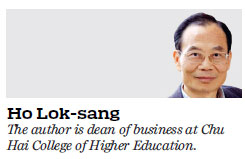HK needs critical, but respectful discourse on public affairs
Updated: 2018-09-26 06:50
(HK Edition)
|
|||||||||
Some recent discussions in the public arena caught my attention. Bruce Lui Ping-kuen, senior lecturer with the Hong Kong Baptist University, criticized Stanley Ng Chau-pei for "launching a personal attack" on the presiding judge in the Court of Final Appeal. Ip Lam-chong, assistant professor with Lingnan University, criticized his colleague Lau Chi-pang for suggesting that the Fanling golf course should be preserved because of its heritage value.
Given that we all cherish freedom of speech, I would argue that disagreeing with a ruling in a court of law and saying why the Fanling golf course deserves to be preserved should both be permissible.
The remark that Ng made and that caused critical comments from Lui is that Geoffrey Ma Tao-li, the CFA judge "acted kindly and complied with the appeal, ruled in favor of immediate release from jail, and allowed the convicted to do evil", and that "the judge has effectively committed professional misconduct"; moreover, "he has turned himself into a killer of young people and a sinner to society."

The remark which Lau made that provoked Ip to criticize him so acidly is he said the Fanling golf course "entails substantial historical value from the British colonial era". Ip took issue with his "deviation" from his former position, citing his remark years ago that Queen's Pier did not carry much historical or heritage value and so should not be preserved. Ip said that as one who had wanted to preserve Queen's Pier, he was "rather surprised that he would be so concerned about the Fanling golf course." Ip then went on to say that, unlike other commentators who were angry with Lau's "shifting the goalposts" - he just felt a strong sense of farce in action.
The point of this commentary is that we all need to use our right to free speech respectfully. There is nothing wrong with taking a particular position, and CFA judges are not out of bounds for criticisms. Ng did not agree with his ruling, and it is his right to criticize the ruling. He thinks that the judge was doing a disservice to, and hurting Hong Kong society, and that leniency might lead to more young people defying the law and engaging in violent actions. Ng certainly used rather strong language, but that is exactly what he meant when he said the judge could be a "sinner to society" and a "killer of young people". Critics can certainly criticize him for using excessively strong language, especially the description of the ruling as a case of "professional misconduct", but calling Ng's statements "personal attacks" on the judge may be unwarranted. Instead of "professional misconduct" he should have used "dereliction of duty". The misuse of the word is unfortunate and should be criticized, but I would defend Ng's right to criticize a ruling. That would not by itself constitute contempt of the court.
In his commentary, Lui went on to discuss the "three supremely important" issues that have been emphasized on the mainland. These are: "The enterprise of the Party is supremely important, the interests of the people are supremely important, the constitution and the law are supremely important." Lui takes issue with the order of the three, and maintains that the legal profession must adhere to legal principles and that should be their single duty as legal professionals, implying that the Party or the public interest has no role in a court decision. He forgot that according to the Constitution of the People's Republic of China the Party's enterprise is to promote the interests of the people. To me, the law is a means to serve the interests of the people, and must not be above the interests of the people.
Coming to Ip's commentary, what really puts me off is that he puts himself on the moral high ground and despises his colleague for taking a stand different from his own. This self-righteous and contemptuous attitude unfortunately is quite prevalent among many commentators. Why can't Lau based on his professional judgment consider Queen's Pier to be of less heritage and historical value than the Fanling golf course? I also see a subtle personal attack on Lau that is quite beside the point in his commentary. After branding Lau's position inconsistent and farcical, he wrote, "Rather than directly pointing to the shifting of goalposts as other commentators do, Lau's inconsistent judgments made me think of two real stories about faculty members devoted to making money on the stock market and evading students and just pursuing personal career goals." One wonders what does he really want to say!
My direct question to Ip is why wouldn't he just present his case as to why he thinks that the golf course in comparison with Queen's Pier is really not deserving preservation. Why should he take such a convoluted narrative telling totally irrelevant stories to present his case?
In my mind, we should all give due respect to our peers. I routinely come across views different from my own on different policy issues. I would just make my case. Is this asking too much of our colleagues and our commentators?
(HK Edition 09/26/2018 page5)